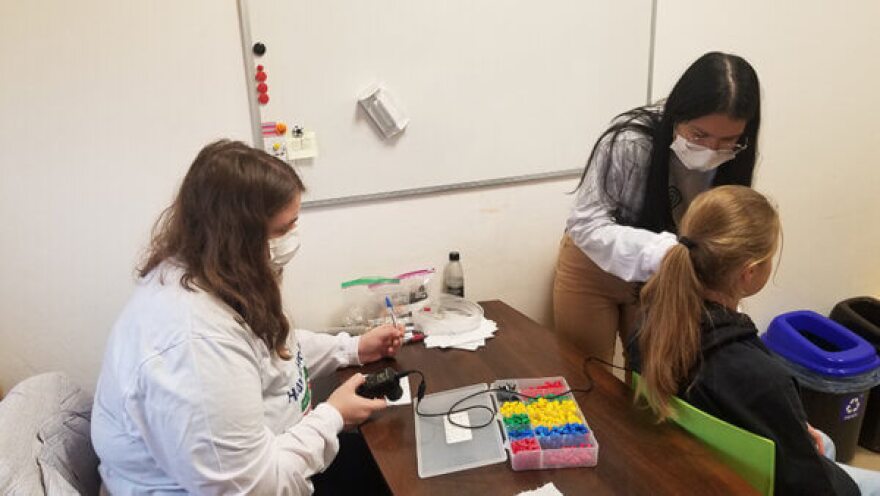A 20-year-old Ukrainian girl had to flee her home with her family in the middle of the night. Before the war, she already had profound hearing loss. But, in the rush to escape and survive Russian bombing, she couldn’t grab her hearing aids.
For the last year, she’s been mostly non-verbal and hasn’t been able to communicate with her family. But, in March, she and her family came to a testing center in Krakow, Poland, with Northern Illinois University audiology professor Dr. King Chung and her Heart of Hearing humanitarian group.
The group, made up of students and faculty from several universities including NIU and University of Sao Paulo in Brazil, were giving hearing tests and fitting refugees with hearing aids. The project was also arranged through the Jewish Community Center in Krakow.
“When she came to us, we thought that she had an intellectual disability," Chung said, "because when we talked to her, she didn't respond or just didn't know what was going on. And then [she] didn't want us to touch her ears. Her mom calmed her down. Then we fit the hearing aids and she just started to cry."
The girl could finally talk to her family again. Dr. Chung says she was so excited, and her mom was crying too. That girl was one of 150 Ukrainian refugees whose hearing Dr. Chung’s team tested on their initial trip in November of last year. They found significant hearing loss with nearly half of them.
Many patients’ hearing loss was caused by the acoustic trauma of Russia’s bombings and artillery.
Emily Kopperud is a third-year audiology doctoral student at NIU. She was part of the second Heart of Hearing trip this March, working at a clinic fitting people with hearing aids.
“If there's like a loud bomb that goes off nearby or something along those lines, it can put a hole in your eardrum," she said. "It's called a perforation and it can really impact your hearing depending on how large that hole is. We saw some individuals who had been so close to a blast that their eardrum was essentially gone.”
Dr. Chung remembers a father and son who were caught in the bombings. The explosions were so close, the father was thrown to the floor and fell on the side of his face.
“We found that he had asymmetric hearing loss,” she said. “He fell onto his right ear. The right ear was close to the ground, so it was shielded from the acoustic trauma, and then the left ear was exposed more to the explosions.”
Dr. Chung says finding almost half of the refugees with significant hearing loss was surprising. The team brought four hearing aids on that first trip. They found they needed 60. That’s when Dr. Chung knew they had to do something about it.
She reached out to the hearing aid manufacturer ReSound and it donated 125 rechargeable hearing aids. Northern Illinois University was also able to crowdfund $8,000 to buy more equipment and fund student travel so they could return to fit the hearing aids.
That second trip in March is when Kopperud and fellow NIU doctoral student Clara Raab came to Poland. The team stuffed all of their clothes into one suitcase, because they were worried about their expensive, delicate equipment being damaged.
“All of our carry-on luggage," said Raab, "was filled with hearing aids and all the tools needed."
She retested the patients’ hearing and Kopperud fitted them with hearing aids. Raab says they had translators and just tried to go slow and make sure the patients were comfortable. They helped kids as young as 7 all the way up to a refugee who was over 100 years old.
To make sure the hearing aid was as fine-tuned as possible, they did “real ear measures” to see how the patient’s ear canal naturally resonates with sound. Kopperud says you have to make sure nothing is ever too soft or too loud. Their high-quality hearing aids also have directional microphones and feedback reduction algorithms. They even have Bluetooth so patients can sync the aids with a cellphone, and adjust them with an app.
They fit 44 Ukrainians with hearing aids in March and Dr. Chung’s group is testing another 24 on her current trip. She’s expecting to find more hearing loss.
“If you think about the people who got out of Ukraine [that] have those kinds of noise induced trauma, or acoustic trauma," she said, "then think about the people [still] in Ukraine."
Dr. Chung says she doesn’t know if people realize that hearing is not just about hearing.
“Helen Keller said that ‘blindness separates people from things, but deafness separates people from people,’" Chung said. "So, what I am thinking is that everyone deserves to communicate and connect with other people."
She says that’s especially true for people without access to sign language learning. They worry about Ukrainians with hearing loss having trouble communicating their needs or even hearing warnings or sirens.
But Raab says she was blown away by the hope and resilience of the refugees.
“I can't tell you how many people were crying through our clinic, just, like, so excited to be able to talk to their spouse again and hear their voice, hear their children, their grandchildren,” she said. “One woman bought us this large tart. She was crying the whole time and kissing us on the cheeks.”
This isn’t “Heart of Hearing”’s first — or last — humanitarian mission. Dr. Chung is back in Poland now. She says she hopes to keep returning and hopefully make it into Ukraine.


